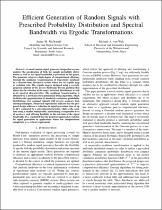 ResearchSpace
ResearchSpace
Efficient generation of random signals with prescribed probability distribution and spectral bandwidth via ergodic transformations
JavaScript is disabled for your browser. Some features of this site may not work without it.
- ResearchSpace
- →
- Research Publications/Outputs
- →
- Conference Publications
- →
- View Item
| dc.contributor.author |
McDonald, Andre M

|
|
| dc.contributor.author |
Van Wyk, MA

|
|
| dc.date.accessioned | 2019-03-27T09:27:27Z | |
| dc.date.available | 2019-03-27T09:27:27Z | |
| dc.date.issued | 2018-09 | |
| dc.identifier.citation | McDonald, A.M. and Van Wyk, M.A. 2018. Efficient generation of random signals with prescribed probability distribution and spectral bandwidth via ergodic transformations. Proceedings of the 2018 European Signal Processing Conference, Rome, Italy, 3 - 7 September 2018 | en_US |
| dc.identifier.uri | http://www.eusipco2018.org/accepted-papers.php | |
| dc.identifier.uri | http://hdl.handle.net/10204/10866 | |
| dc.description | Paper presented at the 2018 European Signal Processing Conference, Rome, Italy, 3 - 7 September 2018 | en_US |
| dc.description.abstract | A novel random signal generator design that accommodates the specification of both the sample probability distribution as well as the signal bandwidth is presented in this paper. The generator achieves a high degree of computational efficiency through the nonlinear transformation of trajectories produced by a discrete–time dynamical system which has an ergodic map as evolution rule. The ergodic map is designed using a recently proposed solution of the inverse Frobenius–Perron problem that allows for the selection of the map’s invariant distribution as well as its spectral characteristics. The nonlinear transformation is obtained via a novel piecewise polynomial fitting algorithm, which facilitates the approximation of absolutely continuous probability distributions over compact support with greater accuracy than existing techniques. Numerical experiments indicate that the proposed design achieves a reduction in signal generation time of up to 22% compared to a conventional generator, while at the same time using a smaller lookup table, maintaining a comparable level of accuracy, and offering flexibility in the selection of the signal bandwidth. It is concluded that the proposed approach is suitable for signal generation in applications where low computational complexity is a critical requirement. | en_US |
| dc.language.iso | en | en_US |
| dc.relation.ispartofseries | Worklist;22308 | |
| dc.subject | Dynamical system | en_US |
| dc.subject | Digital radio frequency memory | en_US |
| dc.subject | DRFM | en_US |
| dc.subject | Inverse Frobenius-Perron problem | en_US |
| dc.title | Efficient generation of random signals with prescribed probability distribution and spectral bandwidth via ergodic transformations | en_US |
| dc.type | Conference Presentation | en_US |
| dc.identifier.apacitation | McDonald, A. M., & Van Wyk, M. (2018). Efficient generation of random signals with prescribed probability distribution and spectral bandwidth via ergodic transformations. http://hdl.handle.net/10204/10866 | en_ZA |
| dc.identifier.chicagocitation | McDonald, Andre M, and MA Van Wyk. "Efficient generation of random signals with prescribed probability distribution and spectral bandwidth via ergodic transformations." (2018): http://hdl.handle.net/10204/10866 | en_ZA |
| dc.identifier.vancouvercitation | McDonald AM, Van Wyk M, Efficient generation of random signals with prescribed probability distribution and spectral bandwidth via ergodic transformations; 2018. http://hdl.handle.net/10204/10866 . | en_ZA |
| dc.identifier.ris | TY - Conference Presentation AU - McDonald, Andre M AU - Van Wyk, MA AB - A novel random signal generator design that accommodates the specification of both the sample probability distribution as well as the signal bandwidth is presented in this paper. The generator achieves a high degree of computational efficiency through the nonlinear transformation of trajectories produced by a discrete–time dynamical system which has an ergodic map as evolution rule. The ergodic map is designed using a recently proposed solution of the inverse Frobenius–Perron problem that allows for the selection of the map’s invariant distribution as well as its spectral characteristics. The nonlinear transformation is obtained via a novel piecewise polynomial fitting algorithm, which facilitates the approximation of absolutely continuous probability distributions over compact support with greater accuracy than existing techniques. Numerical experiments indicate that the proposed design achieves a reduction in signal generation time of up to 22% compared to a conventional generator, while at the same time using a smaller lookup table, maintaining a comparable level of accuracy, and offering flexibility in the selection of the signal bandwidth. It is concluded that the proposed approach is suitable for signal generation in applications where low computational complexity is a critical requirement. DA - 2018-09 DB - ResearchSpace DP - CSIR KW - Dynamical system KW - Digital radio frequency memory KW - DRFM KW - Inverse Frobenius-Perron problem LK - https://researchspace.csir.co.za PY - 2018 T1 - Efficient generation of random signals with prescribed probability distribution and spectral bandwidth via ergodic transformations TI - Efficient generation of random signals with prescribed probability distribution and spectral bandwidth via ergodic transformations UR - http://hdl.handle.net/10204/10866 ER - | en_ZA |





